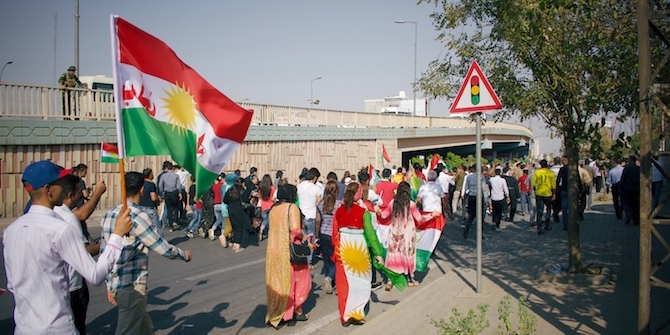by May Darwich
This memo was presented at a workshop in Rabat on ‘The Ethics of Political Science Research and Teaching in MENA’, organised by the LSE Middle East Centre and King Mohammed V University in Rabat on 9-11 June 2015.
In the past decades, many scholars pointed to an intellectual gulf between Middle East studies and mainstream international and comparative political studies. This perceived gap was often attributed to two main reasons. First, Middle East scholars were often accused of focusing on descriptive analyses without rigorous theoretical focus. Many scholars long treated the Middle East as too exceptional to be theory-relevant. This a-theoretical position has impeded Middle East scholars from offering theoretical insights, which might have contributed to theory building beyond the region. The second reason was the refrain of social scientists from using the Middle East in theory development, as scholars focused on developing universal abstract approaches. The past years indicate that much effort has been undertaken to bridge this schism. Recent scholarship on the Middle East is characterised by serious attempts to combine in-depth empirical analyses, on the one hand, with theoretical insights in the political science literature, on the other. This trend is particularly more prominent in comparative politics than in international relations.
In the field of IR, the efforts of bringing together IR theory and Middle East studies have also made some progress. It is not true that the Middle East is totally absent from IR scholarship. Two seminal works remain representative of the benefits of combining theory and the historical development of the region: Stephen Walt’s The Origins of Alliances and Michael Barnett’s Dialogue in Arab Politics. Another recent book is Mark Haas’ The Clash of Ideologies, where the Middle East provided a useful pool to test his theoretical insights on the role of ideology in enmity and conflict. Moreover, other important works on Middle Eastern foreign policies benefited from applying and adapting theoretical frameworks from IR scholarship. The works of Ray Hinnebusch and Fred Halliday have also succeeded in utilising the Middle East in IR theory development. Although scholars nowadays tend to pay more attention to this problem in their research, the pedagogy of the region lacks efforts to bring the Middle East and IR scholarship into a closer dialogue. The task of bridging IR theory and the Middle East currently does fall solely on scholars producing articles and books; it is necessary to also integrate it into pedagogy.
The Middle East is still presented to students as a region that defies existing theoretical arguments and approaches. This dichotomy in teaching Middle East international relations can be underscored in course design (syllabi) and textbooks. A quick survey of syllabi of courses on international relations in the Middle East shows that IR theories and approaches are not fully integrated into the analysis of the region. The structure of the courses is far from broken down following IR models and approaches. This does not mean that courses should follow a rigid pattern. Nevertheless, structuring a course based on approaches and paradigms followed by their application to the Middle East is necessary for an in-depth understanding of both. In fact, structuring courses in a way combining the existing debate within theoretical scholarship and empirical questions is likely to generate new questions and puzzles necessary for students, but also for scholars. Perhaps, it might be worth to simply teach students how IR theories work in the case of the Middle East. This entails teaching how IR theories can explain specific events or conditions in the region based on particular research questions rather than focusing on historical developments. If a particular theoretical approach does not fit, then having students debate the advantages and drawbacks of the theory will certainly enhance their understanding of both IR theory and the region. In other words, IR theory application to the Middle East does not have to be a rigid mould. Instead, this structure will enable students to develop critical thinking and comparative skills.
The problem of the course structure is rendered more visible in the readings presented in course syllabi. Most courses seem to integrate a reading or two on IR theory, but most of those remain focused on historical and descriptive developments in the region. Although descriptive and primary analyses are necessary elements to build a base knowledge for students, theoretical as well as methodological literature remain only marginal. In short, the design of the courses highlights the international relations of the Middle East rather than the International Relations of the region (as a field of study).
The problem of bridging IR and the Middle East in pedagogy is also obvious in textbooks. One can look at what has become the standard textbook International Relations of the Middle East, edited by Louise Fawcett. It is a valuable book, covering a wide range of issues critical to understanding the international relations of the Middle East today. Yet, without meaning to devalue the insightful effort in this book, it also representative of the problem of bridging IR and the Middle East in pedagogy. The book is not organised according to IR theories or paradigms. Although many chapters have incorporated some IR theories, there is a lack of an overall theoretical framework in the book to reflect the disciplinary debates.
The general tendency in teaching the region has been listing IR theories and then arguing that these approaches are inadequate in explaining the international relations of the region. Although dichotomous positions between Middle East specialists focusing on empirical analyses and social scientists concerned with abstract generalisations have lessened in research and publications, there is still need to make similar efforts in the pedagogy of the international relations of the region.
May Darwich is a PhD candidate in Politics and International Relations at the School of Social and Political Science, University of Edinburgh. She is also Research Fellow at the GIGA Institute of Middle East Studies.
Other memos from the workshop
- Sarah Parkinson ‘Towards an Ethics of Sight: Violence Scholarship and the Arab Uprisings’
- Evren Balta ‘Researching the “Unresearchable”: State Politics and Research Ethics in the MENA Region‘
- Karen Young ‘The Perils and Parachutes of Funding in MENA-based Research’
- Guy Burton ‘Teaching Practices of Middle East Politics: Potential and Challenges‘
- David Mednicoff ‘Religious Identity and Social Science Research in the Middle East’
- Nermin Allam ‘Embodied Scholars: The Insider-Outsider Status of Researchers in Field Work’







1 Comments